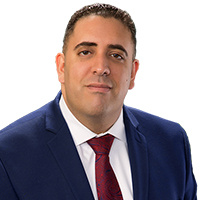District of Columbia White Collar Crime Lawyer List
Sponsored Law Firm
-
 x
x

Click For More Info:
-
Law Office of Mark S. Guralnick
55 Madison Avenue 4th Floor Morristown, NJ 07960» view mapCriminal Defense Law Dedicated. Fearless. Successful.
Mark S. Guralnick and his legal team have helped clients throughout the USA and across the world by applying unparalleled dedication and hard work to each case.
800-399-8371
Farral Ashley Haber
Washington White Collar Crime Lawyer
Farral Haber is a lawyer in Washington D.C. who focuses on white collar crimes. She has tried cases involving healthcare, fraud, embezzlement, a... (more)
Rammy Barbari
Washington White Collar Crime Lawyer
Rammy G. Barbari brings significant professional experience in the legal, international business, and government sectors to Price Benowitz. He is barr... (more)
Louis M. Fischer
Constitutional Law, Criminal, Securities, White Collar Crime
Status: In Good Standing
Shawn D. Bryant
Pharmaceutical Product, Government Contract, White Collar Crime, Products Liability
Status: In Good Standing
Leslie McAdoo
Government Agencies, Corporate, White Collar Crime, Litigation
Status: In Good Standing
Vonda K Vandaveer
Government Contract, Employee Rights, White Collar Crime, Corporate
Status: In Good Standing Licensed: 24 Years
Jonathan Errol Lopez
Litigation, Lawsuit & Dispute, White Collar Crime, Criminal
Status: In Good Standing Licensed: 24 Years
Matthew G Kaiser
Professional Responsibility, Litigation, White Collar Crime, Criminal
Status: In Good Standing
Vonda Kay Vandaveer
Government Contract, Employee Rights, White Collar Crime, Corporate
Status: In Good Standing Licensed: 24 Years
Benjamin Vernia
Immigration, Employment Contracts, White Collar Crime, Personal Injury
Status: In Good Standing
 Mark Guralnick Morristown, NJ
Mark Guralnick Morristown, NJ AboutLaw Office of Mark S. Guralnick
AboutLaw Office of Mark S. Guralnick Practice AreasExpertise
Practice AreasExpertise


